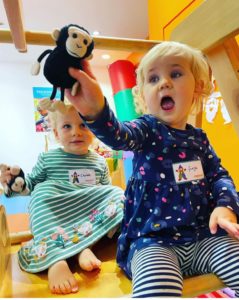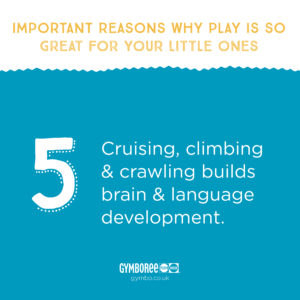Play Builds Better Language Development
A child’s first word is such a precious and memorable moment for any parent or carer. Language skills is something we all prioritise in our child’s development. Language offers such clear milestones for a child as they progress from baby to toddler to pre-schooler.
Babbling to Story Telling
 A newborn’s early attempts at communicating begin with some early ‘coo’ing, laughing and smiling. Then from 4-6 months, a child should begin to babble. This means using sounds like ‘ba’ and the starting to repeat them, so ‘ba ba’.
A newborn’s early attempts at communicating begin with some early ‘coo’ing, laughing and smiling. Then from 4-6 months, a child should begin to babble. This means using sounds like ‘ba’ and the starting to repeat them, so ‘ba ba’.
They will them start to attempt to communicate directly with jargon. It’s an adorable phase, where a child may sound like they are telling you something – often very intently – but it’s not with any recognisable words.
On average, between 12 and 18 months, children will begin to say their first words like “Dada”. From 18 months, children will start to utter their first phrases and sentences. And as their vocabulary grows rapidly, so too will their language skills continually evolve. This leads to some very entertaining story telling when children are 3 to 5 years old.
The Importance of Play
 The role of play cannot be underestimated in each child’s language development. All week, we have been celebrating Play Strong, a campaign to share the benefits of play in physical, emotional, and cognitive development – including language development.
The role of play cannot be underestimated in each child’s language development. All week, we have been celebrating Play Strong, a campaign to share the benefits of play in physical, emotional, and cognitive development – including language development.
Playtime is a time that children love. And when children are engaged and interested, there is greater opportunity for learning and for acquiring language skills. In play situations, it’s helpful to watch and follow their lead. There will be objects, sounds, and textures that arouse their interest. Particularly when they are ‘on the move’ and cruising, crawling and climbing in a fun and interesting environment, like in Explorers, Explorers Plus, Family Play, Pre-school, and Lego classes.
Building Vocabulary
It’s a chance to introduce words and attach them to the environment and situation, helping them to build vocabulary. Music is also a fun way to help children develop linguistic skills. It helps them to build an understanding of the new words and of their meaning. By singing, it also helps children to better enunciate words through repetition.
Singing songs is a fun and interactive way to develop linguistic, listening and motor skills. Aside from exercising turn-taking skills and being exposed to repetition of words and phrases, singing can also help children in enunciating words. Reading books together also helps grow a child’s vocabulary, helping improve speech and memory as well as language development. Language development is just one of many benefits of play.
So why not enquire now and come along to play strong at Gymboree Play & Music!
Next up a round up of Play Strong and the winner is announced!

